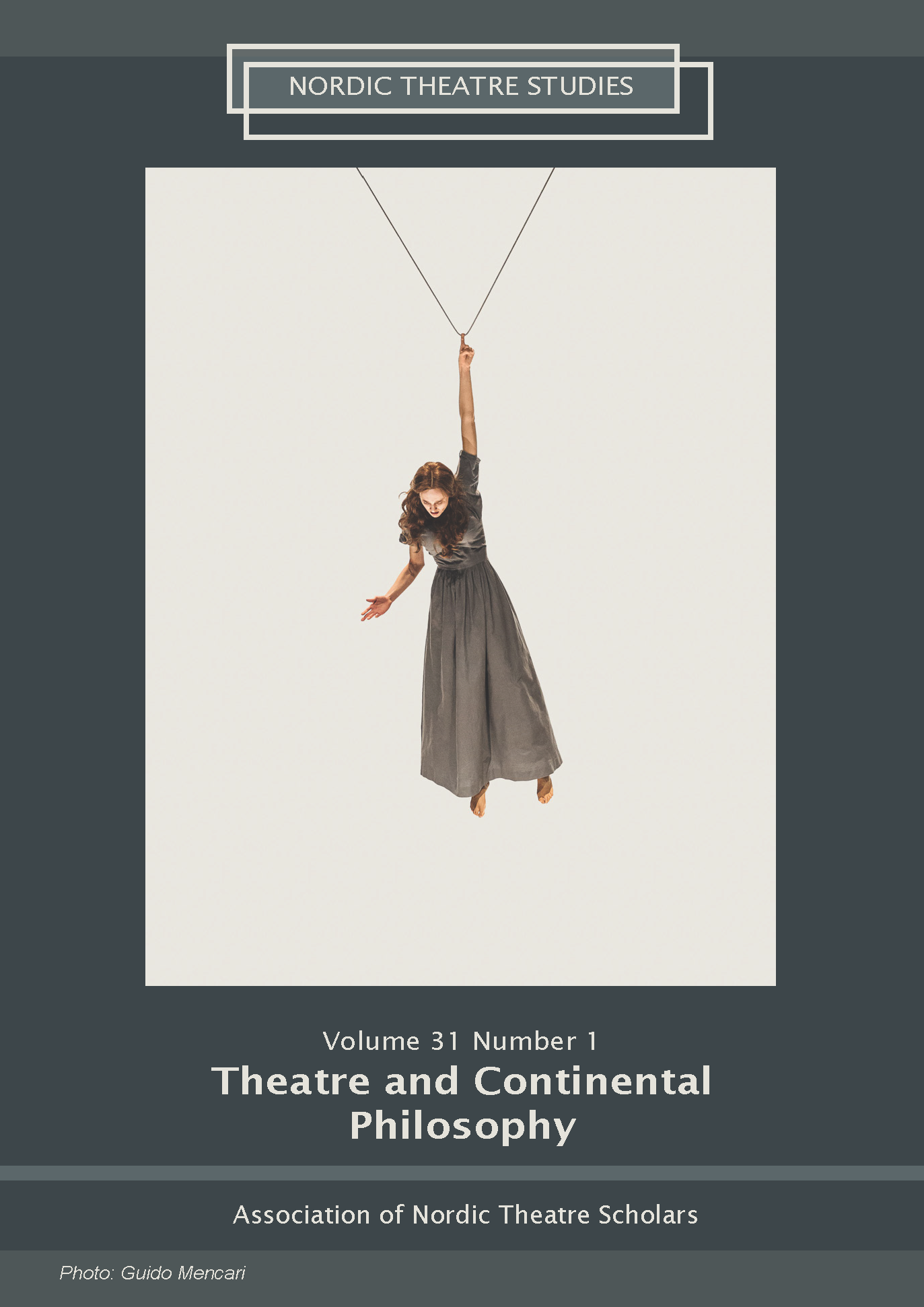“Theatre Phenomenology” and Ibsen’s The Master Builder
DOI:
https://doi.org/10.7146/nts.v31i1.113005Keywords:
Phenomenology, Ibsen, The Master Builder, Heidegger, Building, Dwelling, Thinking, The Fourfold, Being, RehearsalAbstract
How might an actor find inspiration from philosophy to build a world on stage? This article examines how phenomenology can offer a framework for creating performance and a vocabulary for action in rehearsal. Taking Henrik Ibsen’s The Master Builder as a case-study, a number of exercises and approaches are suggested for exploring the text while drawing on Martin Heidegger’s lecture, “Building, Dwelling, Thinking” which ponders the nature of “building”. Far from merely “constructing” an environment, essentially, building is “dwelling”. As the characters in Ibsen’s drama go about their dwelling, actors must build a world
References
Cull, Laura. K. and Lagaay, Alice. 2014. Encounters in Performance Philosophy. London and New York: Palgrave Macmillan.
Carlson, Marvin. 1993. Theories of the Theatre: A Historical and Critical Survey from the Greeks to the Present. Ithaca, NY: Cornell University Press
Fortier, Mark. 1997. Theory/Theatre: An Introduction. New York: Routledge
Glendinning, Simon. 2007. In the Name of Phenomenology. Abingdon and New York: Routledge.
Grant, Stuart, Jodie McNeilly-Renaudie, and Matthew Wagner. Forthcoming. Performance Phenomenology: To the Thing Itself. Palgrave.
Hinden, Michael. 1972. ”Ibsen and Nietzsche: A Reading of The Master Builder.” Modern Drama, 15(4), 403-410.
Helland, Frode. 2009. “Ibsen and Nietzsche: The Master Builder.” Ibsen Studies, 9(1), 50-75.
Heidegger, Martin. 1962. Being and Time. Translated by John Macquarrie & Edward Robinson. Oxford: Blackwell.
— 1971. “...Poetically Man Dwells…”. In Poetry, Language, Thought. New York: Harper & Row, 209-227.
— 1978. Basic Writings. Edited by David Farrell Krell. Abingdon: Routledge.
Ibsen, Henrik. 1981. Four Major Plays. Translated by James McFarlane and Jens Arup. Oxford: Oxford University Press.
Johnston, Brian. 1992. The Ibsen Cycle: The Design of the Plays from Pillars of Society to When We Dead Awaken. University Park, Pa: Pennsylvania State University Press .
Johnston, Daniel. 2011a. “Stanislavskian Acting as Phenomenology in Practice.” Journal of Dramatic Theory and Criticism, 26(1), 65-84.
— 2011b. “Theatre-Making as Aletheia: Rehearsal and the Production of Truth.” Theatre Research International, 36(3), 213-227.
— 2017a. Theatre and Phenomenology: Manual Philosophy. London: Palgrave.
— 2017b. “Ontological Queasiness : Antitheatricality and the History of Being.” About Performance, 14/15, 195-211.
— 2018. “Toward A Workshop in Theatre Phenomenology”. PARtake, 2(1), article 7. Kaufman, Michael W. 1972. ”Nietzsche, Georg Brandes, and Ibsen’s ‘Master Builder’” Comparative Drama, 6(3), 169-86.
McAuley, Gay. Space in Performance : Making Meaning in the Theatre. Ann Arbor: University of Michigan Press, 1999.
Reinelt, Janelle G. and Roach, Joseph R. (eds). 1992. Critical Theory and Performance. Ann Arbor: University of Michigan Press.
Schneider, Magnus T. and Skjoldager-Nielsen, Kim. 2012. “Approaching Phenomenology.” Nordic Theatre Studies, 24.
Stanislavski, Konstantin, 1949. Building a Character. Translated by Elizabeth Reynolds Hapgood. New York: Theatre Arts Book.
— 2008. An Actor’s Work: A Student’s Diary. Translated by Jean Benedetti. London and New York: Routledge, 344.
States, Bert. O. 1985. Great Reckonings in Little Rooms: On the Phenomenology of Theater. Berkeley: University of California Press.
Thomas, James. 2013. Script Analysis for Actors, Directors, and Designers, Third Edition. Burlington and Oxford: Focal Press.
Van Manen, Max. 2016. Phenomenology of Practice: Meaning-giving Methods inPhenomenological Research and Writing. London: Routledge
Young, Julian. 2002. Heidegger’s Later Philosophy. Cambridge: Cambridge University Press.
— 2004. Heidegger’s Philosophy of Art. Cambridge: Cambridge University Press.
— 2006. “The Fourfold”. In Charles Guignon (ed), The Cambridge Companion to Heidegger, Second Edition. Cambridge: Cambridge University Press, 373-392.
Wilshire, Bruce. 1982. Role Playing and Identity: The Limits of Theatre as Metaphor. Bloomington: Indiana University Press.
Zarrilli, Phillip (ed). 1995. Acting (re)Considered: Theories and Practices. London: Routledge.
Downloads
Published
How to Cite
Issue
Section
License
The copyright belongs to the authors and Nordic Theatre Studies. Users can use, reuse and build upon the material published in the journal but only for non-commercial purposes. Users are allowed to link to the files, download the files, distribute the files on a local network (preferably by links), upload the files to local repositories if their institutions require them to do so, but not republish the files without proper agreements with the journal and the author.

